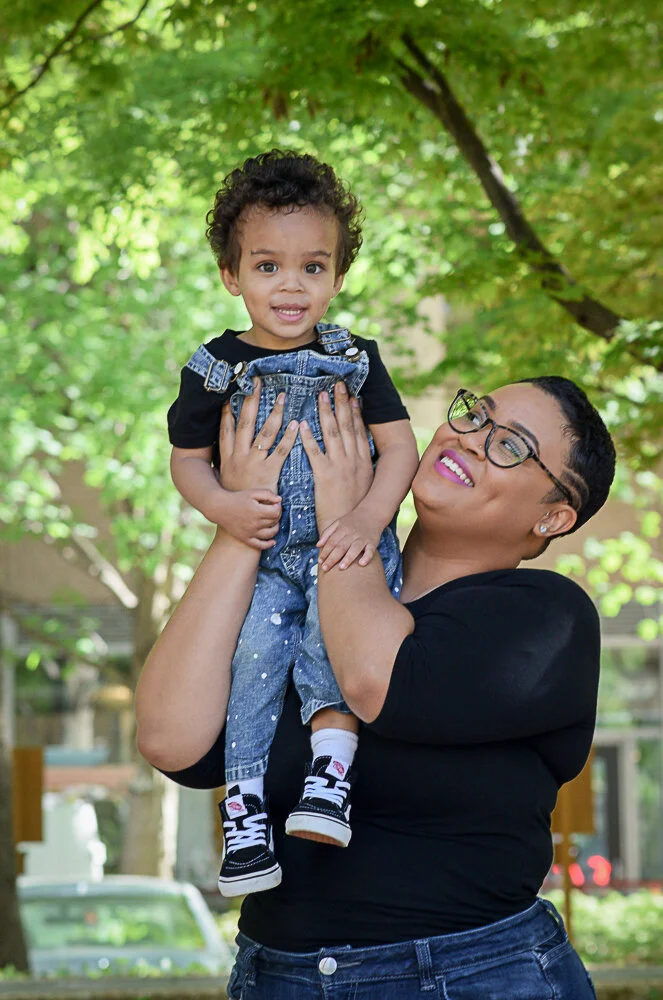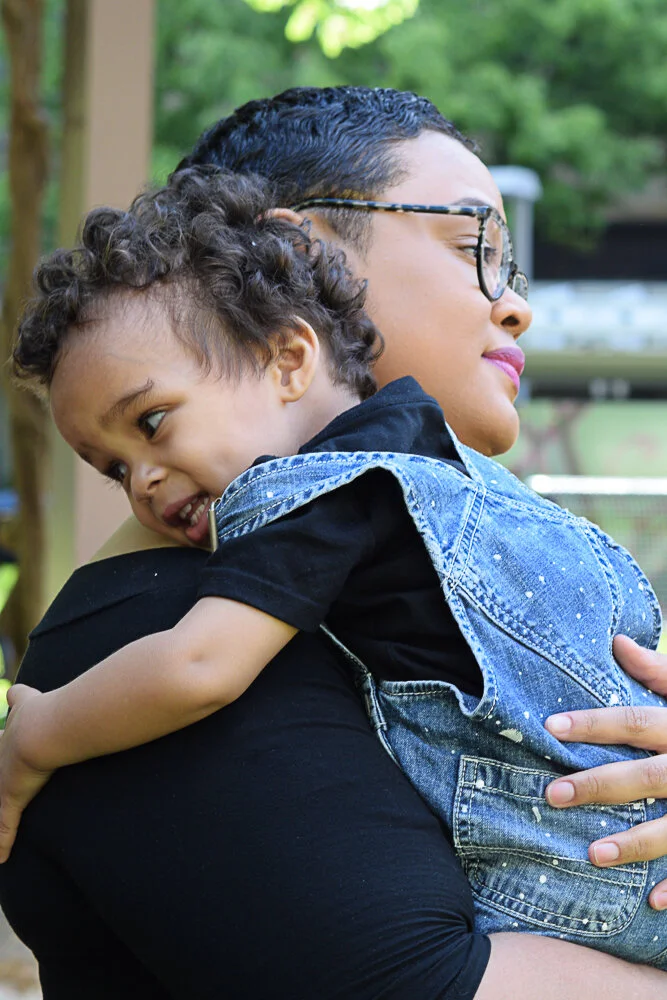Kahni Pr'Out, Defense and Aerospace Engineer
Hi, Kahni! Can you tell me what you do?
I work at a defense and aerospace company. I am technically a model-based systems engineer. The systems I work on are pertaining to armed forces technology -- figuring out a way to streamline that technology, from concept to development to deployment and maintenance as it’s being put on a system, such as a radar on a plane.
Can you share more on your career path?
The first word that comes to mind is “janky”. (laughs) I always knew I wanted to go to school and get as much education as possible. I went to school to become a math teacher and realized I wasn’t able to teach math in a way that kids would understand it. Teaching is a calling and I wasn’t called. Then I got an internship at a university research organic solar cells, and ended up attending that university for graduate school focusing on mechanical engineering. After I finished, I accepted a fellowship in Washington, D.C. since it’s an ideal climate for defense work -- a lot of federal workers and contracting opportunities. But it’s also kind of a pigeonhole that can feel limiting.
What makes it feel like a pigeonhole?
Like many sectors, the defense space is predominantly male and predominantly white. Everyone also has a military background or family in the military. And I think that mentality can bleed over, because the military itself is stuck in a rut. If society has experienced a period of progress, then defense is still in the period before integration. A lot of people have been in positions of power and influence for a long time, and the hierarchy of the military is mirrored in the hierarchy of defense work. There’s a lot of white male classism -- you do what you’re told, fall in line. There’s not a lot of innovation compared to a Google or Linkedin.
I have some points of conflict. In my mind, studying math then mechanical engineering, my expertise can be applied to a lot of things. There’s a noble cause in helping the military and that community, but I could also be solving the Flint water crisis. I’ve had this realization that in a way, I help the U.S. government harm or ignore Black and brown communities. In my role, I do benefit from a Republican presidency, which is tough for me to reconcile.
What would you be excited to get into?
I’ve been reflecting on that a lot for the past three months given that I’m tied to this region because of my son and my partner. The engineering I’d want to do would revolve around clean water, clean energy. That was my thesis -- solar energy. I’d be interested in getting into something more climate-focused, such as wind energy.
Do you have individuals in your network that can be useful in pursuing those fields?
Most of my connections can be tied back to the Department of Energy, the Department of Defense, and national labs. I could network to where I want to be, but that would take some time given that jobs don’t necessarily turn over that frequently, and we’re in a hiring freeze.
This specific climate is a challenge, too, given that the President does not believe in climate change. I came into my current role during the transition. I watched renewable energy departments get gutted. There are startup businesses focusing on these things, but they’ve anticipated being impacted and aren’t looking to bring on additions right now. So I do have a network that can be helpful, but a shift in government policies would be great.
What is it like for Black women in defense work?
There are very few. There are always very few. I went to an HBCU for undergrad, and I feel like I was in a bubble. I was affirmed and pushed forward. They always said “This isn’t how it’s going to be when you get into the workforce -- you will be the one of one, or one of few.” When I got to Iowa State for graduate school, I was one of two. When I got to work, it was the same thing. I thought I’d have better armor built up by now, but it’s taxing emotionally. I just can’t show up as my whole self.
I work with a therapist, and something I have arrived at is that I believe it is an act of resistance to maintain in this space. I had a boss watch Hidden Figures, and come to me and ask “How do you feel it?” I told them I’d just read the book and hadn’t seen the movie, and they said, “Well, you’re like Katherine Johnson, except you don’t work in the basement.” Moments like that happen and you just think, “Did you really just say that?” At one point, I would try to catch myself and not roll my eyes or make anybody uncomfortable. Now, I’m at a point where I don’t care anymore, because that person just made me uncomfortable, so they can receive that same energy. There was a time when I wouldn’t get designs in my hair and now I don’t care. So I’m slowly finding these small acts to push back against the status quo.
What are some of your self-care practices?
I write quotes by Black and Afro-Latinx women on small Post-Its, and I’ll add them to my Skype profile. I like having those available and surrounding me while at work. I recently got into scented oils, and I have a plant. I try to get in earlier than others to get myself in the right mode. I might listen to a podcast. At home, I have similar practices. I burn sage and candles. I like cooking...there’s something about chopping veggies and doing something healthy for yourself. Finding time to work out is helpful. When I’m afforded the opportunity to work from home, it’s helpful to log off and go to the gym for a bit. And, of course, my son. He’s all about the moment and so being with him is very grounding.
Do you have any advice for young women interested in engineering?
Engineering gets a lot of clout. Engineers are automatically considered smart because they have a highly technical education. That used to really intimidate me. I spent so much time trying to compare myself to others, especially because I was coming from a math background and had originally wanted to be a teacher, so I didn’t have the same ‘credentials’ as my colleagues. And while I still compare myself, I have come to see that being a Black woman, being progressive, and having my background is what sets me apart. I’m always thinking about engineering from not just a technical perspective but also a strategic one. I want us to create systems that are built more for protection and not just defense, which is different than most of my colleagues. So that becomes my unique perspective in a meeting. Just remember not to spend so much time focusing on what you don’t have, because they’ll do that for you.
What do you love about what you do?
I genuinely love science, engineering, and technology. I love working to solve complex problems. Even just having the opportunity to think about other people’s work and seeing people present is exciting. I love knowing about the newest and latest.
Is defense work a highly collaborative space?
Not always. There are classification levels for defense and aerospace, so if you aren’t “need to know” then you can’t really collaborate or be part of certain discussions. Internal research and development requires some collaboration, but we don’t work as closely as people might at a Google or LinkedIn.
Who is in your support system? Do you have any mentors?
I was fortunate enough to meet one of my very good friends, Julian Anderson Lee. She was my grad mentor, and became my roommate, then best friend. She works at a similar company and a competitor of my own employer. So we don’t talk about our actual work as much as we talk about things like, “This person said this to me -- am I tripping?” Or just airing frustrations about a particularly difficult technical issue we’re having trouble solving. The affirmation and validation are amazing. It’s also nice to have her as an outlet because I speak to some of the women in the company where I work, but they’re white women. I don’t feel that I can talk about everything I’m experiencing because sometimes they’re the perpetrators. I also have some mentors from my previous jobs who are Black men, such as Jalil Hudson.
What are you looking for ?
I’m seeking to transition my career so that I’m more excited about what I do more often. Where I work, watching news is part of my job, and what happens with China or North Korea has a different bearing for me. It’s a lot. I feel conflicted, and I’m ready to move past the phase of being conflicted. I make good money, and I do enjoy what I’m doing, but as a Black woman, I don’t always feel great about what I do. In a way, I feel that being a Black woman is against the nature of the business I’m in. I’m looking forward to finding an engineering role that sits well with me. And there’s a lot of focus on how Black women are underrepresented in STEM fields, but I’m also realizing that every Black woman I’ve ever talked to no matter their degree or profession always find themselves in racist and sexist environments. There is no easy path, so we have to push back.
Please share this post with a friend, and follow us at @BlackWomenWorkIG!


